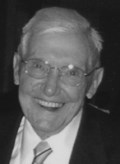A Veteran of the Battle of the Bulge, the Late Jack O'Keeffe of Morris County Knew Who the Real Enemy Was

In the spring of 1994, no one in Morris County knew much about Chris Christie. Sure, some truly committed political junkies may have recalled that Christie tried to run for the state Senate the year before, but messed up his nominating petition. Call it a rookie mistake.
So when Christie, then in his early thirties, announced he was running for a freeholder nomination in that year's Republican primary, it wasn't really that big of a deal.
As the race developed, political observers were surprised to see Christie team up with Jack O'Keeffe, a man more than twice his age with 30-years experience in county politics. Both men apparently knew what they were doing; both won the primary and became freeholders in January, 1995.
O'Keeffe was often Christie's only ally on a board that was suspicious of the ambitious young man from Livingston who had just (relatively speaking) moved to Morris County.
Now it's more than 22 years later and the outgoing governor and O'Keeffe, who died in 2011, again have something in common - public places named in their honor.
An access road to a Morris County park was named after the governor two weeks ago and later this month officials in O'Keeffe's hometown of Denville are scheduled to adopt an ordinance naming a plaza outside township hall after him. "I didn't want him to become a footnote in town government" was the explanation of Denville Mayor Tom Andes regarding the move to honor O'Keeffe.
Public tributes of this sort are not uncommon, but O'Keeffe's public service career and life - even when separated from his relationship with Christie - are worth talking about.
O'Keeffe liked to say that he had been around in politics for so long that the first time he sought public office in Denville, the man at the top of the GOP ticket that election year was Barry Goldwater. That would have been 1964.
O'Keeffe, who was a World War II veteran and an engineer by profession, was not the type of politician who wins election once and then is consistently reelected. Nope. His career both in Denville and later as a freeholder was marked by wins and losses, and then more wins and more losses.
But when he won and took office, he got results. Officials say he was instrumental in developing the municipal library and township recreation services.
One of his losses as Denville mayor was a rout in 1987. O'Keeffe's political "crime" was supporting a legal settlement to build affordable housing in the township. O'Keeffe knew that would be fatal to his
reelection, but he backed the deal anyway, because it was the right thing to do. Regarding what is many times irrational opposition in some locales to low-income housing, O'Keeffe once wistfully remarked that some people attend church on Sundays to pray for the poor, but then forget about it the rest of the week.
Even on the county level, O'Keeffe had an up and down career. He was elected to the freeholder board in 1988 and lost in 1991. He was reelected with Christie in 1994 only to lose three years later.
I covered him during his freeholder days as a reporter with the Morristown Daily Record. O'Keeffe's strength was his ability not to get too high after wins, or too low after losses. He also kept a sense of humor and reacted fairly well to criticism.
A pivotal issue during that era was garbage. With old landfills closing up, each county had been charged with devising its own trash disposal solution. There was a time when the Morris freeholders considered building a trash incinerator in Roxbury Township and transfer stations, places where garbage is transferred from small trucks to big trucks, in Mount Olive and Parsippany. The stations were built; the incinerator was not.
These plans, not surprisingly, drew widespread public opposition and it was common for protesters to demonstrate outside the homes of freeholders. When that happened, some freeholders made sure they were away from home or safely stayed indoors.
Not so O'Keeffe.
He came out, debated with the protesters, and actually agreed to meet some of them at a later date for a conversation in a more refined setting.
It's unfortunate that more elected officials are not more comfortable engaging their opponents.
Of course, O'Keeffe was from an earlier generation of politicians when your opponents were simply people with whom you disagreed, not your "enemy." As a veteran of the Battle of the Bulge, O'Keeffe knew who the real enemy was.
To his credit, O'Keeffe enjoyed sparring with the press and was always candid. I once asked him why he planned to propose an issue at an upcoming freeholder meeting that was sure to be rejected.
"Ah, just to bust chops," he said with a laugh. You had to love the attitude.
When O'Keeffe passed, Christie said, "Jack was my first political mentor and role model. He stood for everything that's good about public service - integrity, commitment and principle. There's not a day I've spent as governor where I didn't think about him."
Earlier, when Christie was sworn in as U.S. Attorney, a host of Morris County politicos attended the ceremonies. But they were all in the audience; only O'Keeffe had a seat on stage.
It's so easy to be cynical about politics these days and for good reason.
But the relationship between O'Keeffe and a young Chris Christie was genuine. And when it began in 1994, who could have imagined that it would end with Christie as governor and both men having public places named after them.





